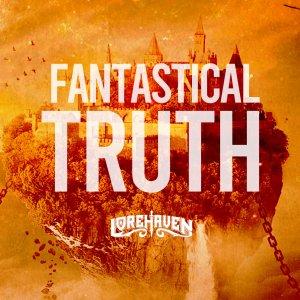Fantastical Truth

161. How Can We Celebrate the Restoration of Failed Franchises?
Imagine a mind virus has taken over people you love. You have fought the good fight. Now you’re tired and feel like retreating. You and some old friends are desperate for a solution. Then one captain says he has a surprise. You open vast hangar bay doors to discover … a wonderful fantasy franchise, lovingly restored, with everything back as it should be, yet better. But how? “Well,” says the restorationist, “you can thank the good ol’ common grace of our Creator for that. Also, I’m a lot like you—a huge fan of the original.” Yes, many franchises are failing. So let’s celebrate a few that seek restoration!
Subscribe to Lorehaven
articles • news • library • reviews • podcast • gifts • guild
Episode sponsors
- Enclave Publishing: Radiant by Ashley Bustamante
- The Wizard’s Stone by Herman P. Hunter
- The Pop Culture Parent
Concession stand
- Especially when exploring Picard, we’ll try to avoid spoilers .
- Optimism about present/future restoration is still limited by reality.
- Most franchises are restricted by bad stories, so a good one stands out.
- This episode is a more positive sequel to two previous episodes:
- 144. Which Top Six Fantasy Franchises Gave Fans Grief in 2022?
- 153. When Can Deconstructionism Threaten Christian Fiction? | with Michael Young aka ‘Wokal Distance
1. First the bad news: many franchises are still failing
- Star Wars. Fans are really feeling the Meh-dolorian (cf. Pitch Meeting).
- DC. Excitement about Gunn’s reboot seems artificial/shallow/trend-based.
- Marvel. There was a new movie this weekend. Its numbers are lackluster.
- Disney. Still failing. Did anyone see that Peter Pan remake? Lowery, why?
- LOTR: Again, we’re still reeling about the thud that was TROP season 1.
- Harry Potter: On the ropes, despite talk of a streaming series remake.
- Doctor Who. Tennant’s back but it’s kinda bait. Showrunner goes Sexualityist.
- Oh, then there’s the writers’ strike, which could set back all the things!
 ONSCREEN: ‘Star Trek: Picard’ Resists Alien Assimilation to Boldly Celebrate Heroes and Family
ONSCREEN: ‘Star Trek: Picard’ Resists Alien Assimilation to Boldly Celebrate Heroes and FamilyYes, the third season of Star Trek: Picard really is that good. That’s especially true if you grew up enjoying the Enterprise-D crew’s adventures across seven seasons, or at least some of their continuing cinematic missions aboard the Enterprise-E. I’ll wager even Trek newcomers would find something to love. But longtime Trek fans will get the most enjoyment from long-open plot resolutions and, frankly, some drastic tonal and thematic course corrections after Picard‘s first two seasons got trapped in postmodern spatial anomalies.
If you’re still skeptical, especially after the grimdark mess and leftist elements of Discovery, I’d like to win you back aboard.
2. Star Trek: Picard does restoration at warp speed
- Characters: back to normal, flawed yet matured; best of all, respected.
- Plot: nods to disputative stories (seasons 1-2), resolves many old ones.
- World: fully continuous with every older Trek series including Enterprise.
3. How we hope other franchises will learn from Trek
- Right now, Disney/Marvel, Doctor Who, TROP already seem too far gone.
- Star Trek itself needs to forge its respectful future with Star Trek: Legacy.
- The other Star world needs to let go and use the force of its own legacy.
- Creators must heed the “sacred [world] texts,” interpreted with honor.
- Ignore both Abrams-style fanservice or Johnson-style “deconstruction.”
- If WBD remakes Harry Potter, don’t “woke” it up. Films mark a tall order.
- DC, whatever else they do, must commit to completing the Snyderverse.
- Emphasize music, meaningful “Easter eggs,” struggle-earned “nostalgia.”
Mission update
- Reviews: Radiant last Friday, The Lost Property Office this Friday
- Articles: How to Discern Beautiful Christian Fiction Without Becoming Snobs, from Josiah DeGraaf this Thursday
- Subscribe free to get updates and join the Guild
Com station
Autumn shares a mostly positive view of cultural Christianity (ep. 160):
As far as cultural Christianity goes, I did have a lot of that growing up and for the most part it was beneficial. Christianity was explained pretty well for me at a young age, and it resonated with me when it came to ideas like the deep imperfection of humanity, the problems with vengeance, the need for forgiveness and mercy, etc. There were some downsides as well, though, such as the fact that even though the Bible was interesting to me, growing up with it made regular Bible reading feel like a chore that I had a hard time doing even though I knew it was important, good and meaningful. Still, the positives outweighed the negatives.
But one of the reasons growing up with cultural Christianity worked in my case was because Christianity DID mean a lot to me. I was always analyzing everything I heard, so instead of just taking the cliches at a surface level, I would try to figure out why certain aspects of Christianity existed. There were times I struggled with going through the motions, but I’m at least aware of that, and it’s something I’ve been working on over the years.
Next on Fantastical Truth
Our podcast is Fantastical Truth. Yet even seeking the truth can lead us into shadowy places. How can we discern these conspiracy theories without rejecting the truth that humans do often plot secretly, or falling into the trap of Gnostic “secret knowledge”? Mike Duran, author of the new nonfiction book Christians and Conspiracy Theories, will sneak into the studio.






 Visit Podcast Website
Visit Podcast Website RSS Podcast Feed
RSS Podcast Feed Subscribe
Subscribe
 Add to MyCast
Add to MyCast